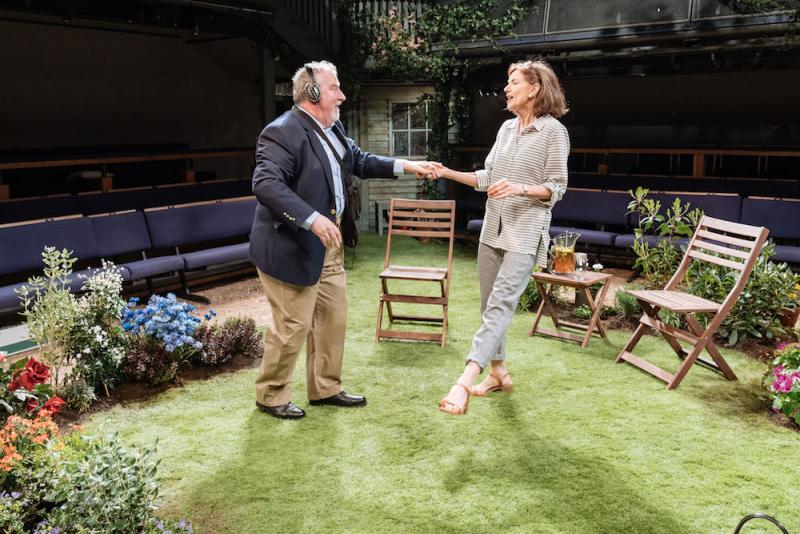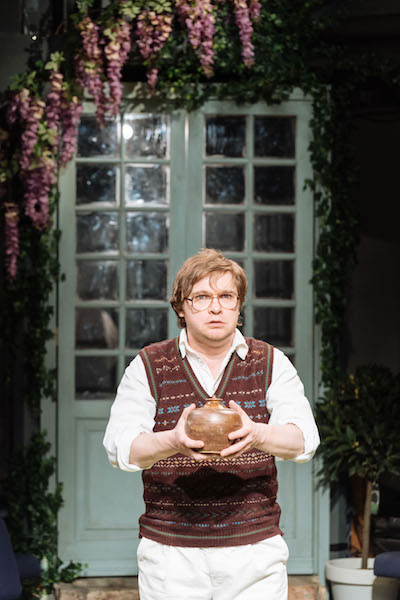Humble Boy, Orange Tree Theatre review - love, death and science in Middle England | reviews, news & interviews
Humble Boy, Orange Tree Theatre review - love, death and science in Middle England
Humble Boy, Orange Tree Theatre review - love, death and science in Middle England
Spirited revival of Charlotte Jones's 2001 hit buzzes with fun

Good programming is an art, and Paul Miller – artistic director of the Orange Tree Theatre – is clearly on a continuous roll with his inspired mixing of the old and the new, forgotten classics and new voices, revivals and premieres. And he loves to take risks.
It combines laugh-out-loud delights with a quietly moving ending
Set in a pretty country garden, this tragi-comedy explores the conflict between generations in a nice middle-class family. Felix is a 35-year-old Cambridge University astrophysicist who is visiting his mother, Flora, after the death of his father. While he struggles to reconcile himself to the loss, and his depressed and suicidal feelings, his mother is thinking of marrying George, a neighbour whose daughter Rosie was once Felix's girlfriend. Comic relief comes in the shape of Mercy, Flora's scatty friend, who in a celebrated luncheon scene adds a spoonful of the dead father's ashes to the gazpacho. Only Jim the gardener seems to really understand Felix.
Written with a zesty confidence, Humble Boy is a metaphor-rich family drama that throws handfuls of allusions into the flowerbeds, and then watches references to the mother-son relationship at the centre of Hamlet blossom (Felix is shocked by evidence of Flora's sexual desires, and prevaricates about committing suicide). Buzz, buzz! As well as using astrophysics metaphors about black holes and string theory, the fact that Felix's father was a beekeeper means there are jokes about Flora being the Queen Bee and other symbolic mentions of entomology. It is also a play about Englishness, about emotional reticence, and about how the desire to be an exceptional individual (Felix is a brainbox) can clash with the challenges of ordinary family life.
 But despite Felix's suicidal thoughts, this is also a story about emotional healing. Although its picture of Middle England is one in which men typically resent being dominated by strong women, there are plenty of moments when this is softened by the balm of laughter. If sons struggle to accept the infidelity of their mothers, a possibility of reconciliation does exist, and the whole eccentricity of the piece's ideas, metaphors and language carries with it a quiet joy. When we find out that there is a child called Felicity, and bearing in mind the meaning of Felix's name, things begin to look up – hope and happiness are possible.
But despite Felix's suicidal thoughts, this is also a story about emotional healing. Although its picture of Middle England is one in which men typically resent being dominated by strong women, there are plenty of moments when this is softened by the balm of laughter. If sons struggle to accept the infidelity of their mothers, a possibility of reconciliation does exist, and the whole eccentricity of the piece's ideas, metaphors and language carries with it a quiet joy. When we find out that there is a child called Felicity, and bearing in mind the meaning of Felix's name, things begin to look up – hope and happiness are possible.
Jones's writing is not only delightfully quirky, it is also generous in spirit and bursting with cleverness. Miller's highly enjoyable production, whose designer Simon Daw produces a garden full of fragrant blooms, is full of pleasurable moments, such as George's in-the-round pissing and Mercy's bravura saying of grace, which provoked applause on the press night. The witty references to Shakespeare, to Newton and to Marie Curie sit comfortably with the evocation of Second World War bomber pilots and Middle England conventions. Yes, this is us alright. In our middle-class country guise.
Jonathan Broadbent (pictured above) plays Felix as a battered teddy bear of a man, with the convincing roughness of the depressed and lonely, while Belinda Lang as his mother Flora can drip acidic comments convincingly, even if she lacks the majesty and steel of Diana Rigg. Paul Bradley has a rugged charm as George while Selina Cadell's Mercy calls up a veritable litany of squeaks, squawks and hilarously gormless twitches. Rebekah Hinds's Rosie is all heart and Christopher Ravenscroft is reliably sincere as Jim the gardener. Characterised by black humour, loopy writing and good acting, this show combines laugh-out-loud delights with a quietly moving ending.
rating
Explore topics
Share this article
The future of Arts Journalism
You can stop theartsdesk.com closing!
We urgently need financing to survive. Our fundraising drive has thus far raised £49,000 but we need to reach £100,000 or we will be forced to close. Please contribute here: https://gofund.me/c3f6033d
And if you can forward this information to anyone who might assist, we’d be grateful.

Subscribe to theartsdesk.com
Thank you for continuing to read our work on theartsdesk.com. For unlimited access to every article in its entirety, including our archive of more than 15,000 pieces, we're asking for £5 per month or £40 per year. We feel it's a very good deal, and hope you do too.
To take a subscription now simply click here.
And if you're looking for that extra gift for a friend or family member, why not treat them to a theartsdesk.com gift subscription?
more Theatre
 Little Brother, Soho Theatre review - light, bright but emotionally true
This Verity Bargate Award-winning dramedy is entertaining as well as thought provoking
Little Brother, Soho Theatre review - light, bright but emotionally true
This Verity Bargate Award-winning dramedy is entertaining as well as thought provoking
 The Maids, Donmar Warehouse review - vibrant cast lost in a spectacular-looking fever dream
Kip Williams revises Genet, with little gained in the update except eye-popping visuals
The Maids, Donmar Warehouse review - vibrant cast lost in a spectacular-looking fever dream
Kip Williams revises Genet, with little gained in the update except eye-popping visuals
 Ragdoll, Jermyn Street Theatre review - compelling and emotionally truthful
Katherine Moar returns with a Patty Hearst-inspired follow up to her debut hit 'Farm Hall'
Ragdoll, Jermyn Street Theatre review - compelling and emotionally truthful
Katherine Moar returns with a Patty Hearst-inspired follow up to her debut hit 'Farm Hall'
 Troilus and Cressida, Globe Theatre review - a 'problem play' with added problems
Raucous and carnivalesque, but also ugly and incomprehensible
Troilus and Cressida, Globe Theatre review - a 'problem play' with added problems
Raucous and carnivalesque, but also ugly and incomprehensible
 Clarkston, Trafalgar Theatre review - two lads on a road to nowhere
Netflix star, Joe Locke, is the selling point of a production that needs one
Clarkston, Trafalgar Theatre review - two lads on a road to nowhere
Netflix star, Joe Locke, is the selling point of a production that needs one
 Ghost Stories, Peacock Theatre review - spirited staging but short on scares
Impressive spectacle saves an ageing show in an unsuitable venue
Ghost Stories, Peacock Theatre review - spirited staging but short on scares
Impressive spectacle saves an ageing show in an unsuitable venue
 Hamlet, National Theatre review - turning tragedy to comedy is no joke
Hiran Abeyeskera’s childlike prince falls flat in a mixed production
Hamlet, National Theatre review - turning tragedy to comedy is no joke
Hiran Abeyeskera’s childlike prince falls flat in a mixed production
 Rohtko, Barbican review - postmodern meditation on fake and authentic art is less than the sum of its parts
Łukasz Twarkowski's production dazzles without illuminating
Rohtko, Barbican review - postmodern meditation on fake and authentic art is less than the sum of its parts
Łukasz Twarkowski's production dazzles without illuminating
 Lee, Park Theatre review - Lee Krasner looks back on her life as an artist
Informative and interesting, the play's format limits its potential
Lee, Park Theatre review - Lee Krasner looks back on her life as an artist
Informative and interesting, the play's format limits its potential
 Measure for Measure, RSC, Stratford review - 'problem play' has no problem with relevance
Shakespeare, in this adaptation, is at his most perceptive
Measure for Measure, RSC, Stratford review - 'problem play' has no problem with relevance
Shakespeare, in this adaptation, is at his most perceptive
 The Importance of Being Earnest, Noël Coward Theatre review - dazzling and delightful queer fest
West End transfer of National Theatre hit stars Stephen Fry and Olly Alexander
The Importance of Being Earnest, Noël Coward Theatre review - dazzling and delightful queer fest
West End transfer of National Theatre hit stars Stephen Fry and Olly Alexander
 Get Down Tonight, Charing Cross Theatre review - glitz and hits from the 70s
If you love the songs of KC and the Sunshine Band, Please Do Go!
Get Down Tonight, Charing Cross Theatre review - glitz and hits from the 70s
If you love the songs of KC and the Sunshine Band, Please Do Go!

Add comment